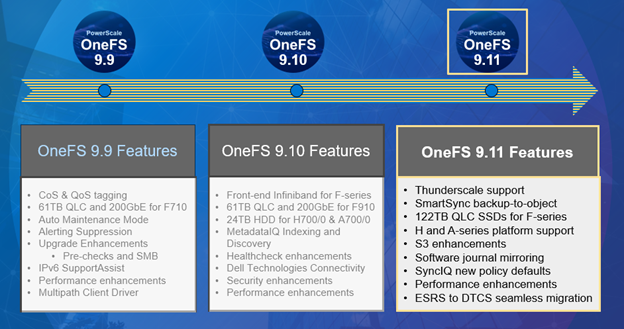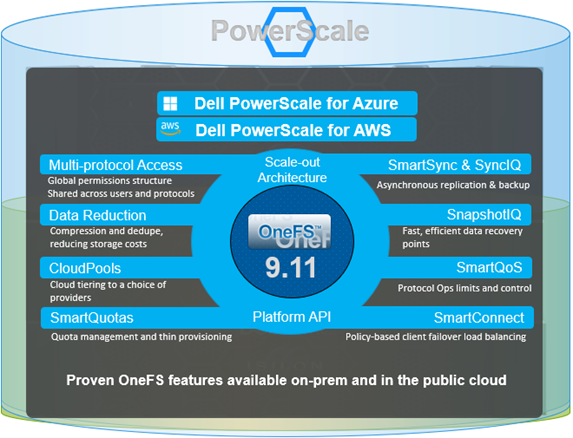In the runup to next month’s Dell Technologies World 2025, PowerScale is bringing spring with the launch of the innovative OneFS 9.11 release, which shipped today (8th April 2025). This all-encompassing new 9.11 version offers PowerScale innovations in capacity, durability, replication, protocols, serviceability, and ease of use.

OneFS 9.11 delivers the latest version of PowerScale’s software platform for on-prem and cloud environments and workloads. This deployment flexibility can make it a solid fit for traditional file shares and home directories, vertical workloads like financial services, M&E, healthcare, life sciences, and next-gen AI, ML and analytics applications.
PowerScale’s scale-out architecture can be deployed on-site, in co-location facilities, or as customer managed Amazon AWS and Microsoft Azure deployments, providing core to edge to cloud flexibility, plus the scale and performance and needed to run a variety of unstructured workflows on-prem or in the public cloud.

With data security, detection, and monitoring being top of mind in this era of unprecedented cyber threats, OneFS 9.11 brings an array of new features and functionality to keep your unstructured data and workloads more available, manageable, and durable than ever.
Hardware Innovation
On the platform hardware front, OneFS 9.11 also unlocks dramatic capacity enhancements the all-flash F710 and F910, which see the introduction of support for 122TB QLC SSDs.
Additionally, support is added in OneFS 9.11 for future H and A-series chassis-based hybrid platforms.
Software Journal Mirroring
In OneFS 9.11 a new software journal mirroring capability (SJM) is added for the PowerScale all-flash F710 and F910 platforms with 61 TB or larger QLC SSDs. For these dense drive nodes, software journal mirroring negates the need for higher FEC protection levels and their associated overhead.
With SJM, file system writes are sent to a node’s local journal as well as synchronously replicated, or mirrored, to a buddy node’s journal. In the event of a failure, SJM’s automatic recovery scheme can use a Buddy journal’s mirrored contents to re-form the Primary node’s journal, avoiding the need to SmartFail the node.
Protocols
The S3 object protocol enjoys conditional write and cluster status enhancements in OneFS 9.11. With conditional write support, the addition of an ‘if-none-match’ HTTP header for ‘PutObject’ or ‘CompleteMultipartUpload’ requests guards against overwriting of existing objects with identical key names.
For cluster reporting, capacity, health, and network status are exposed via new S3 endpoints. Status monitoring is predicated on a virtual bucket and object, and reported via GETs on the virtual object to read the Cluster Status data. All other S3 calls to the virtual bucket and object are blocked, with 405 error code returned.
Replication
In OneFS 9.11, SmartSync sees the addition of backup-to-object functionality. This includes a full-fidelity file system baseline plus fast incremental replication to ECS/ObjectScale, AWS S3, and AWS Glacier IR object stores. Support is provided for the full range of OneFS path lengths, encodings, and file sizes up to 16TB – plus special files and alternate data streams (ADS), symlinks and hardlinks, sparse regions, and POSIX and SMB attributes.
OneFS 9.11 also introduces the default enablement of temporary directory hashing on new SyncIQ replication policies, thereby improving target-side directory delete performance.
Support and Monitoring
For customers that are still using Dell’s legacy ESRS connectivity service, OneFS 9.11 also includes a seamless migration path to its replacement, Dell Technologies Connectivity Services (DTCS). To ensure all goes smoothly, a pre-check phase runs a migration checklist, which must pass in order for the operation to progress. Once underway, the prior ESRS and cluster identity settings are preserved and migrated, and finally a provisioning phase completes the transition to DTCS.
In summary, OneFS 9.11 brings the following new features and functionality to the Dell PowerScale ecosystem:
| Feature | Description |
| Networking | · Dynamic IP pools added to SmartConnect Basic |
| Platform | · Support for F-series nodes with 122TB QLC SSD drives |
| Protocol | · S3 cluster status API |
| Replication | · SmartSync File-to-Object |
| Support | · Seamless ESRS to DTCS migration
|
| Reliability | · Software Journal Mirroring for high-capacity QLC SSD nodes. |
We’ll be taking a deeper look at the new OneFS 9.11 features and functionality in blog articles over the course of the next few weeks.
Meanwhile, the new OneFS 9.11 code is available on the Dell Support site, as both an upgrade and reimage file, allowing both installation and upgrade of this new release.
For existing clusters running a prior OneFS release, the recommendation is to open a Service Request with to schedule an upgrade. To provide a consistent and positive upgrade experience, Dell Technologies is offering assisted upgrades to OneFS 9.11 at no cost to customers with a valid support contract. Please refer to this Knowledge Base article for additional information on how to initiate the upgrade process.